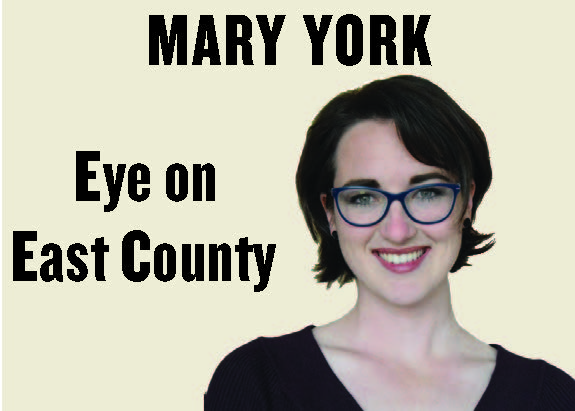Journalism is dying, says someone in my head as I slam the car door and shuffle my way toward the Granite Hills High School welcome center. It’s the voice of a few college professors, people from church, half a dozen of my parents’ friends and my friends’ parents – essentially, anyone in the last fifteen years who has felt entitled to let me know that I’m entering a career field that has an expiration date.
The Clarion is the Eagles’ student newspaper and some twenty-five students sit bright-eyed and bushy-tailed as two girls escort me inside. I used to sit in a room like this. I know the student paper life – I have been on three of them. It is in rooms like this one that journalism students first hear well-intentioned adults say, “journalism is dying.”
The two young ladies who scooped me up at the school’s visitor check-in and walked me across campus to their classroom wore bashful smiles as they asked me questions and answered mine, but their eyes were sharp and inquisitive. They were the ones who, while looking for businesses to advertise with their newspaper, had stumbled across our paper’s office in downtown El Cajon. Like the insatiable journalists they are likely to become, they followed their noses inside and asked if I would come visit their school.
For their audacity alone, I had to said, “Yes.”
So there I was, holding a stack of my most recent issues and a copy of theirs. Two dozen aspiring journalists stared at me, pens poised to take notes without having to be encouraged to do so. I had practiced the “journalism is dying” speech in the car on the way over – the nice way to say it, the way that says it doesn’t have to die, that suggests there is an alternative if we all work hard and get creative. And at some point in the next hour, I’d probably have to say it.
It has been a while since I have been in front of a class and I’m a little more nervous than I’m used to.
I introduce myself – I’ve been freelancing on and off for the better part of a decade, I’m an editor of a small community newspaper, I’ve won a handful of awards. I tell them that everything I know about being a journalist I learned from a student newspaper or on the job from colleagues or from my own mistakes. I tell them that journalism is important and that they’ve picked a great field and that they probably won’t ever make any money unless they go into broadcast. I decide not to tell them yet that journalism is dying. This doesn’t feel like the moment.
“You’ve got a great paper,” I said a little awkwardly, wondering how I was going to fill 45 minutes – not that there isn’t plenty to talk about, but where to start? “Would you like some critique?”
I said it more as a half-hearted suggestion, but the room practically burst open at the question.
Given unanimous permission, I unfolded a copy of the Clarion and we began.
“You really ought to have lines between the stories,” I say.
“I told you, Zack!” says a boy at the far right table with a victorious grin. The blond-headed boy in the center of the room smiled quietly and shook his head. “I’ve been telling him,” the first boy insists to me loudly. The whole room is laughing.
They are clearly comfortable with each other and their welcoming demeanor relaxes me.
Deep breath.
“What’s going on with your fonts here?” I ask. Giggles ripple around the class. “Pick one and stick to it. Create consistency in your aesthetic.”
We talk about the rules of page design and they have tons of questions. They want examples, so we pull out some of my sample issues. Having critical eyes scanning my work makes me very aware of how little effort I sometimes put in when deadline hounds the editor’s desk.
We move on to pictures and someone asks about sizes. Someone asks about placement. Someone asks about framing. Zack asks about lighting.
“A good picture tells a story,” I said. “A great picture tells the story of a human. Put people in your pictures. Get their faces.”
Everyone bends over their notepads, scribbling furiously.
Next we tackle headlines. What stories go on the front page and why?
“You get to decide what the reader sees first, and most people don’t ever look past the top of the front page, so you have to put the most important stories there,” I explain to a room full of now-serious faces. “That’s called news judgement: deciding what’s important.”
A voice in the back asks for an example and I think for a moment.
“Okay,” I begin. “This year we had a Westboro Church protest outside two East County schools. It was a big deal in our community and got coverage in county papers as well. I almost didn’t go cover the protests because I didn’t want to give hate any more of a platform than it had already. But what would we be saying about the issue if we didn’t cover it at all? What would we be saying if we put the story on the second page instead of the front cover? Even our silence tells our readers something about the story. News judgement and news bias are in an eternal tango. Know what your bias is so you can consciously keep it off the front page.”
Someone asks if sports can go on the front page, to which I respond emphatically: Yes! Someone else points a finger at poor Zack for some issue or another, inciting another round of friendly laughter, and I finally ask, “Who is Zack anyway?”
“He’s our editor-in-chief,” several voices say in union.
“Ah,” I respond looking at the well-kempt young man at the center table, “So you’re the last line of defense. You make the 11th-hour calls. You have to exercise news judgement.”
He nods at me seriously as if he understands the weight on his shoulders.
I notice a flyer for the school debate club pinned to the top of the white board and I ask, “Does anyone in here do debate?”
A few hands shoot up.
“Listen, you all need to consider joining debate club,” I say. “I competed in high school speech and debate for four years. Journalism classes will teach you how to write, but debate will teach you how to think. And journalists need to know how to think – not what to think, how to think. You need to be able to discern between the values and perspectives of your sources, weigh issues to see what holds up against logic and reason and recognize when a story is only being half told or told incorrectly.”
A girl with golden curls is nearly in tears at the front left table – she’s the debate captain and has a hard time recruiting people into the club.
“I realize everyone is busy,” I say, “but if football players will take ballet classes to gain flexibility and balance, if you care about your craft, you should take debate to better train your mind. Train your mind so you can improve your news judgement and keep your bias in check. Learn how to think so you can be a really good journalist.”
The tone of the classroom has become solemn, pensive. Now would be the moment to tell these kids not to worry, journalism is dying anyway.
Instead, I take a deep breath and say what I wish someone had told me.
“This job is hard. You’ll get paid in pennies, you’ll work exhausting hours and your efforts will largely go unnoticed and unappreciated. People will be difficult and accusatory – get used to the term ‘fake news’ because I don’t think it’s going anywhere. Sources won’t talk and important stories will end in dead-ends and disappointment. Some days you’ll feel like you’re disappointing everyone. Some days you’ll be asked to cover tragedies, talk to people who have just lost loved ones or seen their homes swallowed up by wildfire. You’ll go home and sit with the ghosts of all these terrible things, all these stories that need to be told before they can find peace. But none of this can make you a bad journalist – the only thing that can make you a bad journalist is you. So be a good one.”
For a minute, there is silence – a rare kind of moment in a room full of journalists. Then all the heads bend down over notepads and two dozen kids begin scratching out the reminder on sheets of lined paper, a reminder that hopefully they will revisit in their notes over the next few months or few years of their journey as student journalists. Hopefully, one day, the call to be a good journalist will burn on the front of their minds without them ever having to look at that piece of paper.
Forty-five minutes disappeared quickly and I found myself wishing everyone luck and gathering my things before we even got around to talking about the future of news online, maintaining a web presence, avoiding clickbait tendencies… But something tells me they’ll be just fine.
This generation of journalists will not be as daunted by the changing tide of technology and the news because they have grown up in it. Maybe they are best suited to adapt and improve and carry the torch into the future. Maybe journalism won’t be dying after all.
My escorts are waiting at the door to help me navigate through the lunch crowd back to the welcome center. I take one last look around the classroom. Kids are packing up their belongings and shoving them into backpacks, laughing and talking. They are sharp and ready. The captain of the debate club is scratching my contact information left on the whiteboard into her planner – she’ll contact me before the week is out to come speak to her debate class. Zack is still sitting quietly at his table, looking calm and competent beyond his years.
Yes, I think to myself, if these are the future journalists of America, the seekers and guardians of truth and the protectors of the free world, I think the future is in good hands.













